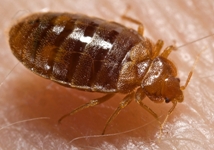On 11 May the Center for Disease Control and Prevention in the USA published the results of a peer-reviewed study that suggests bedbugs may be involved in disease transmission.
The study, conducted in an impoverished community in Vancouver, Canada, tested a small sample (five) of bedbugs collected from three patients who were hospitalised for unstated causes. One of the study”s authors suggested that even though this was a small study, it suggests that bedbugs may be playing a role in the transmission of MRSA in inner city populations where bedbug infestations are a problem.
|
Hypothesizing the bugs were vectors for “the transmission of antimicrobial drug-resistant pathogens” researchers performed tests which found the bacteria Methicillin-resistant Staphylococcus aureus (MRSA) and Vancomycin-resistant Enterococcus faecium (VRE) present in the collected pests. Marc Romney, one of the study”s authors, noted “even though this is a small study, it suggests that bedbugs may be playing a role in the transmission of MRSA in inner city populations where bed bug infestations are a problem.” Since the release of the report, the study has been widely picked up by the press in the USA – click here for an example. |
|
|
The National Pest Management Association (NPMA) has reviewed the report and found that it leaves many questions unanswered. NPMA says they do not plan to fuel this conversation and public fear by promoting news coverage of the survey. Comments from NPMA will cite the study as one of the many examples of why additional, scientific research on bed bugs must be conducted. NPMA is encouraging its members to refrain from comments suggesting that bedbugs may contribute to the spread of MRSA or other diseases. NPMA has prepared the following statement for use by members Talking points
|
|


